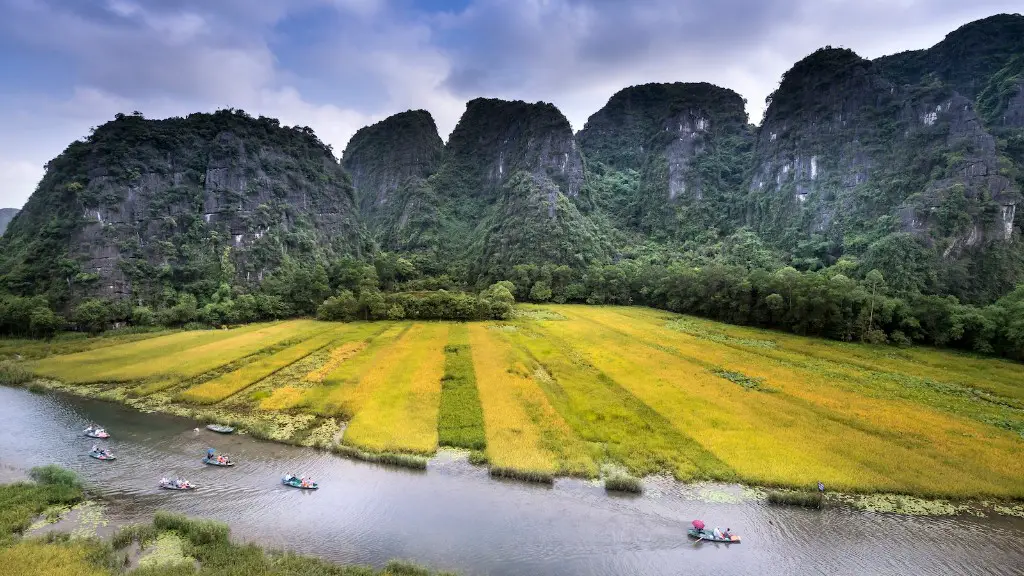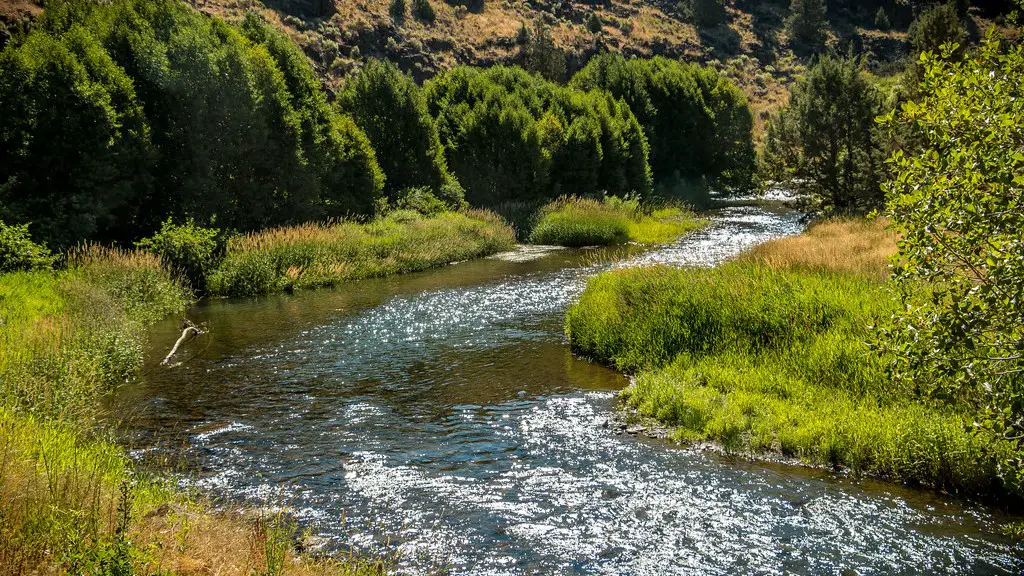The Nile River and Ancient Egypt
The Nile River formed the lifeblood of ancient Egypt, so it is no surprise that it was an essential part of the country’s trade networks. By connecting the Mediterranean Sea to the interior of the African continent, the Nile opened up vast economic possibilities to the Pharaohs of ancient Egypt. By controlling the river, they were able to maintain a powerful trade system with many areas of the Mediterranean and Africa.
The Egyptians had several options when it came to trade and commerce. The most important was the Nile itself, which allowed merchants to sail as far south as modern-day Sudan, as well as the eastern and western shores of the Mediterranean Sea. This meant that traders had access to goods from all across the world, including precious stones, timber, gold, spices, incense and more.
The Nile was also used to transport goods. Large barges made of wood and reeds could carry large amounts of materials and goods. These boats would travel down the river from Aswan to the Mediterranean, carrying both raw materials and finished products. Depending on the goods, traders could then transport them to far-off places such as Greece, Rome or even Arabia.
The Nile provided an almost perfect navigation channel for trading in ancient Egypt. The river was wide and deep enough to accommodate large ships. The current was gentle, making it easy for the ships to sail against the current. The river was also well-known for its strong winds, making it easy for ships to navigate on the open sea. On top of this, the riverbanks were lined with fertile lands which provided the ideal conditions for agriculture.
But the river was not only used for trade. It was also used to transport people. Caravans and traders travelled along the banks of the river, either by sailing boats or walking. And it was not only the locals who used the river – the Egyptians welcomed foreign merchants and traders to their shores.
The Nile River was also an important factor in the military success of the Pharaohs. As it formed their internal defence line, it allowed their armies to move quickly and effectively. In addition to this, the river provided an essential link between the Delta and the Mediterranean, making it easy for the Egyptians to maintain control and power in the region.
Overall, the Nile River was a major factor in the development of ancient Egypt. By allowing access to goods, people and knowledge from around the world, the ancient Egyptians were able to leverage the river’s many benefits. As such, it is no surprise that the river played an important role in the immense power and wealth of the great Pharaohs.
Irrigation for Agriculture
As with most ancient societies, the Egyptians were heavily dependent on their environment for resources. Each year, the Nile would flood its banks, creating rich and fertile soil that was perfect for growing wheat and other grains. Farmers and agricultural workers would take advantage of this annual bounty, making the most of the land alongside the river.
It was the floodwaters of the Nile that provided the Egyptians with access to food and other resources. By controlling how and when this flood occurred, the Pharaohs were able to create sophisticated irrigation systems that were essential for crop cultivation. This allowed the Egyptians to have consistent access to food, even during drier periods.
The Egyptians were also able to exploit the alluvial soils left by the floods. These soils were highly fertile and able to support a wide range of crops, including barley and flax. This allowed the Egyptians to have a healthy, balanced diet and ample food supplies for the growing population.
In addition to providing resources for agriculture, the floods also served another important purpose. When the waters receded, it left behind a thick layer of silt, which provided essential nutrients for the soil. This meant that the land near the river was more productive than anywhere else in the area.
Overall, it is clear that the Egyptians were heavily reliant on the Nile for their resources. By managing and utilising the river’s floodwaters and alluvial soils, they were able to create a stable and prosperous society. Without the Nile’s annual bounty, it is likely that the Egyptians would not have been able to progress as they did.
Domestic and International Trade
The ancient Egyptians used the Nile to conduct domestic and international trade. This was essential for the country’s economic success and ability to remain a powerful player in the Mediterranean region. As the only river in the region, the Nile provided traders with access to vast markets.
The Egyptians also had access to a wide range of raw materials and products. This was due to the desert’s mineral-rich hills, which provided access to gold, copper, turquoise and other minerals. The inland areas provided access to grains, fruits and other foodstuffs.
The country’s domestic traders were also able to capitalize on the river’s trade capabilities. Many of the goods traded in Egypt originated from the Delta region, and were sent down the river to the cities of the upper and lower Egypt. These cities then served as the main hubs for the country’s trade.
The Nile was also essential for the international trade of the Egyptians. By using the river as a gateway, merchants were able to travel to many different countries. The Egyptians had access to a wide range of goods from Greece, Rome, Arabia and parts of Africa, as well as from their own country.
The Egyptians also used their trade network to spread their culture and beliefs. This was especially true with Egypt’s religious practices, which were heavily influenced by the cultures of the countries they traded with. The Pharaohs even went so far as to send missionaries throughout the region, to ensure the spread of their religion.
Overall, it is clear that the Nile had an enormous impact on the economy of ancient Egypt. By providing access to resources, food and products, the river allowed the country to develop and thrive. The river also connected Egypt to other cultures and countries, which allowed them to create a powerful and sophisticated trade network.
Ancient Technology
The Egyptians were adept at using technology to make the most of the Nile’s resources. For example, they constructed dams and other structures to control the river’s water levels. This allowed them to regulate the water flow and store it for times of drought and famine.
The Egyptians also devised a way to move goods along the river. They built barges and boats to carry large amounts of goods down the Nile. This made it possible for merchants and traders to carry large amounts of goods across the region.
In addition to this, the Egyptians were also able to make use of the river’s natural conditions. For example, they used the river’s strong winds to propel their sailing vessels, making it much easier to travel down the river. Furthermore, they were able to construct irrigation systems that allowed them to make use of the floodwaters for crop cultivation.
Overall, it is clear that the ancient Egyptians were adept at making use of the river’s natural resources. By harnessing the river’s water, wind and nutrient-rich soils, they were able to create a sophisticated and advanced agricultural and trading system.
Conclusion
The Nile River was essential for the success of ancient Egypt. By providing the country with access to resources, food and products, it allowed the Egyptians to create a powerful and prosperous society. It was also the main factor in the growth of the region’s trade, as it provided a gateway to the Mediterranean and other countries. And lastly, the river’s natural conditions allowed the Egyptians to make use of its wind, water and soils to create an advanced civilization.





